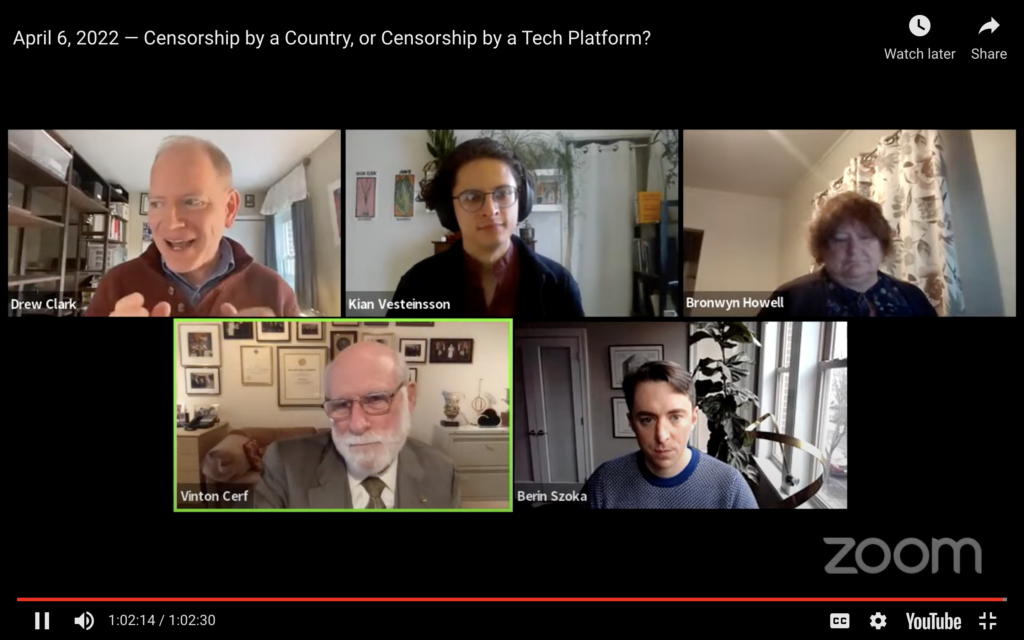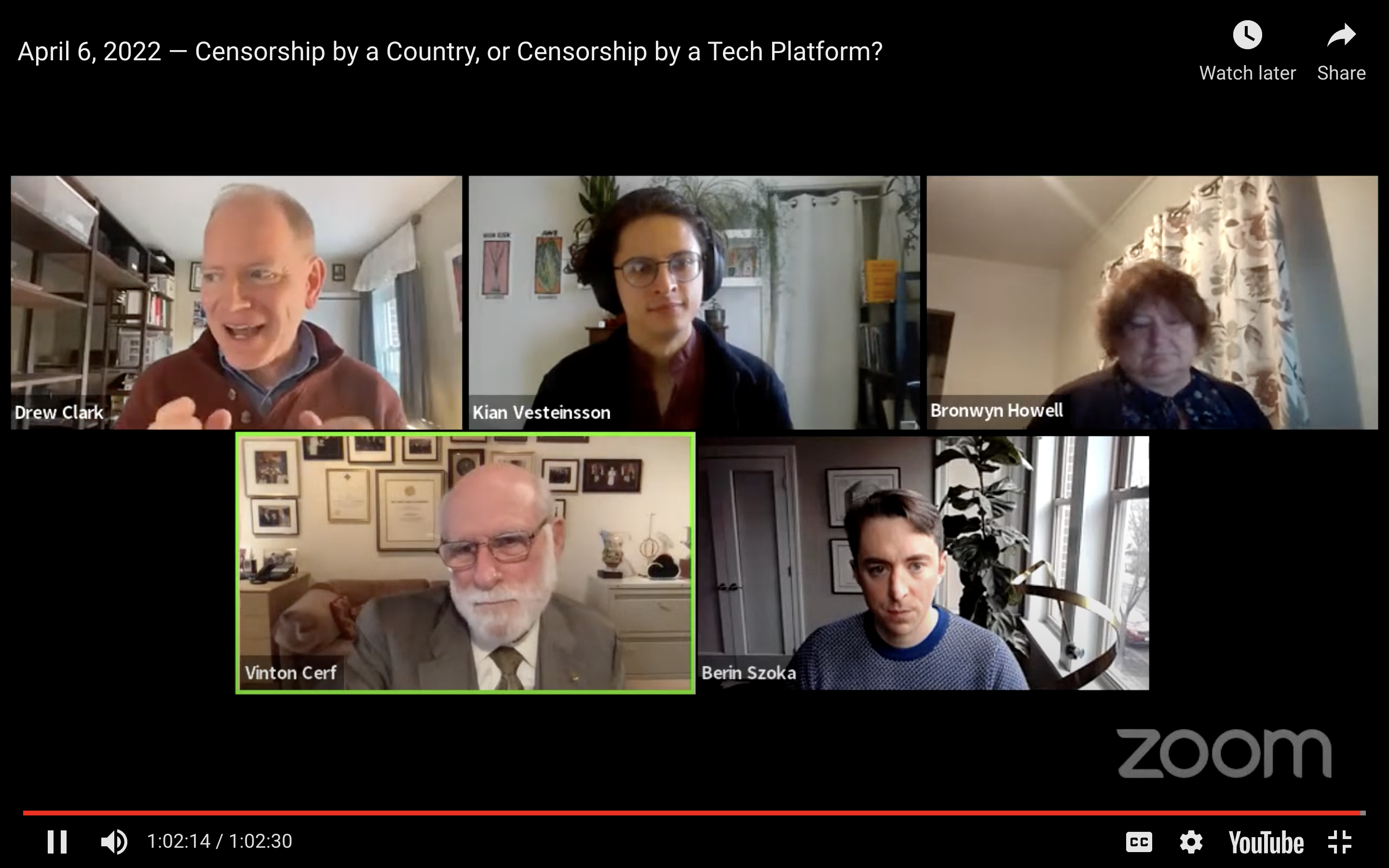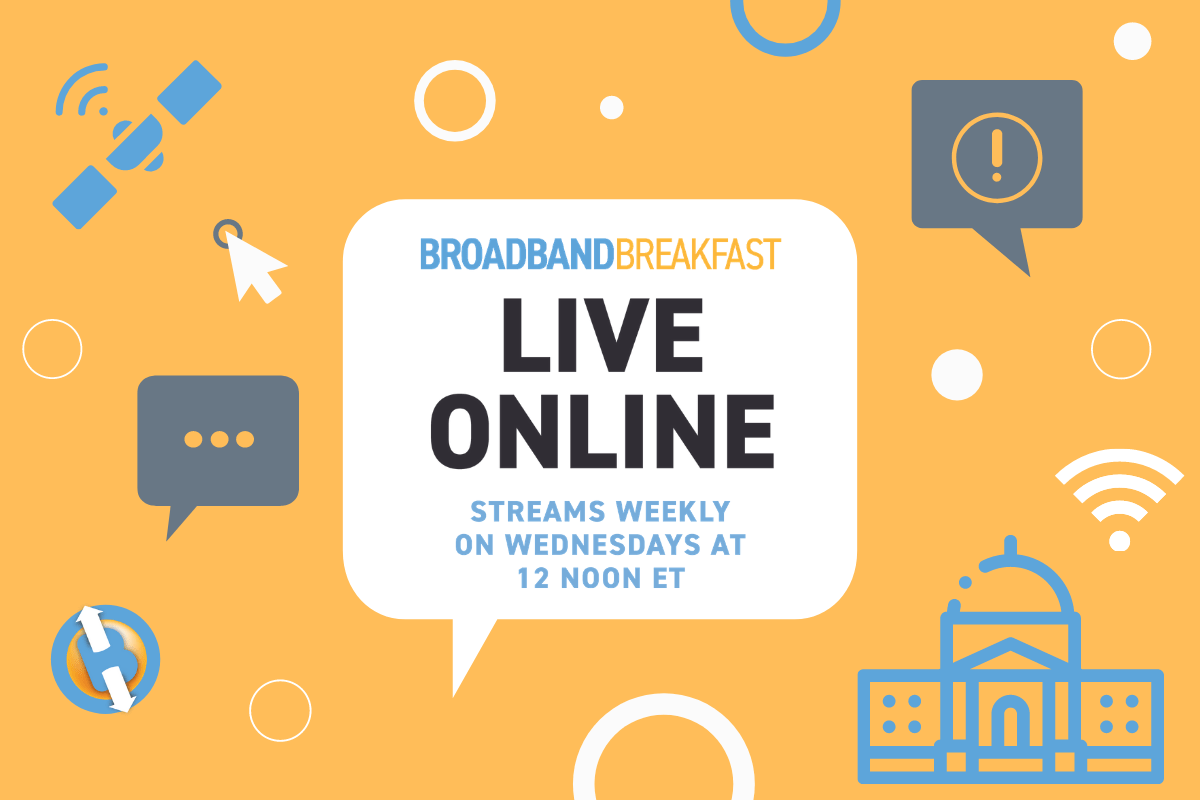Panelists Urge Government Resist Getting Involved in Content Moderation
Google’s Chief Internet Evangelist Vint Cerf warned against government intervention in online moderation.
Theadora Soter

WASHINGTON, April 14, 2022 — Vint Cerf, a vice president and chief internet evangelist at Google, warned against government moderation of content on the internet during a panel event last week, as Washington focuses on addressing the power of big technology platforms.
“Deliberate government censorship is almost never helpful because it inhibits the ability of the population to learn things it should know and needs to know,” said Cerf at the April 6 Broadband Breakfast live event, which discussed internet censorship.
While Cerf is adamant that the government should not play a role in online content moderation, he is also not an advocate for company censorship either.
“Censorship by companies is not necessarily any more attractive, except that it’s forced on many of those companies, including mine, partly because we impose those terms and conditions in the hope of shielding people from harmful behavior or we are induced and provided with incentives to do that because if we don’t do that there will be fines that are inimical to business,” Cerf said.
“My sense is that we’re going to be forced to cope with some form of censorship whether it’s self-censorship or some kind of censorship imposed by legislative rule,” added Cerf. “My primary desire is to maximize the utility of the internet and do whatever we can to minimize its harmful abuse.”
Fellow panelist at the event, Berin Szoka, president of tech lobbyist TechFreedom, echoed Cerf’s point saying, “The best answer is for the government to stay out because in the United States, it is simply not a proper thing for government officials to get involved in how content is moderated.”

Screenshot taken from the April 6 Broadband Breakfast Live Online event
The discussion comes as debate swirls in Washington about what to do about big tech platforms and market power. The Department of Justice and the Federal Trade Commission have been tasked by President Joe Biden with enforcing antitrust laws that includes addressing monopoly power and businesses practices perceived as anticompetitive.
Szoka was quick to dismantle Biden’s antitrust approach at the Wednesday event. “This is not an antitrust issue; it can’t be an antitrust issue,” he said. “Antitrust is about regulating business practices, not editorial judgements. There are a lot of people who want to make this an antitrust issue on both sides of the aisle.
“Republicans want revenge against big tech platforms for perceived bias and Democrats want somehow for antitrust law to do something about abstract values like diversity in media, or human rights, or whatever and these are simply inappropriate things for competition law to address,” he added.
Our Broadband Breakfast Live Online events take place on Wednesday at 12 Noon ET. You can also PARTICIPATE in the current Broadband Breakfast Live Online event and REGISTER HERE.

Wednesday, April 6, 2022, 12 Noon ET — Censorship by a Country, or Censorship by a Tech Platform?
Residents of countries under authoritarian control face censorship of what they can post online and limitations on what websites they can visit. At home in the U.S., much of the political right views current content moderation policies of social media platforms as their own form of censorship. How do these content control practices compare? Just how similar are the scenarios and solutions proposed by their opponents? Join us for a timely Broadband Breakfast conversation about hot domestic and international issues amid the tumult on the world scene today.
Panelists for this Broadband Breakfast Live Online session:
- Bronwyn Howell, Nonresident Senior Fellow, American Enterprise Institute
- Kian Vesteinsson, Research Analyst, Freedom House
- Berin Szoka, President, TechFreedom
- Drew Clark (moderator), Editor and Publisher, Broadband Breakfast
Panelist resources:
- Freedom on the Net 2021: The Global Drive to Control Big Tech, Freedom House
- Facebook is Failing Iranians, and Iran’s Leaders Are About to Launch a Censored Internet, Broadband Breakfast, January 28, 2022
- Elon Musk to Join Twitter’s Board of Directors After Becoming Largest Shareholder, Wall Street Journal, April 5, 2022
- Justice Thomas’s Misguided Concurrence on Platform Regulation, Lawfare, April 14, 2021
- No, Florida Can’t Regulate Online Speech, Lawfare, March 12, 2021
- The Wall Street Journal Misreads Section 230 and the First Amendment, Lawfare, February 3, 2021
- TechFreedom amicus brief
- Gunning for Facebook and free speech, Bronwyn Howell, American Enterprise Institute
- Can international social media censorship succeed?, Bronwyn Howell, American Enterprise Institute
- Calling out the ‘Christchurch call’, Bronwyn Howell, American Enterprise Institute

Bronwyn Howell is a nonresident senior fellow at the American Enterprise Institute, where she focuses on the regulation, development, and deployment of new technologies and the use of technology in the health sector. She also uses multiple methodologies from economics, decision sciences, public policy, and governance to address issues of policy and management in the information, communications, and digital technology industries. As a resident of New Zealand, she is especially interested in exploring how experiences in other countries (notably Australia, New Zealand, and South Africa) can inform debate and policy in the United States (and vice versa).
Kian Vesteinsson is a research analyst for technology and democracy at Freedom House, where he serves as an expert on human rights in the digital age. He covers Asia for Freedom on the Net, Freedom House’s annual assessment of internet freedom, and has also covered sub-Saharan Africa and western Europe for the publication. Previously, Kian worked at Human Rights Watch and the National Association of Criminal Defense Lawyers.
Berin Szoka serves as President of TechFreedom. Previously, he was a Senior Fellow and the Director of the Center for Internet Freedom at The Progress & Freedom Foundation. Before joining PFF, he was an Associate in the Communications Practice Group at Latham & Watkins LLP, where he advised clients on regulations affecting the Internet and telecommunications industries.
Drew Clark is the Editor and Publisher of BroadbandBreakfast.com and a nationally-respected telecommunications attorney. Drew brings experts and practitioners together to advance the benefits provided by broadband. Under the American Recovery and Reinvestment Act of 2009, he served as head of a State Broadband Initiative, the Partnership for a Connected Illinois. He is also the President of the Rural Telecommunications Congress.

Illustration from BetaNews
WATCH HERE, or on YouTube, Twitter and Facebook.

As with all Broadband Breakfast Live Online events, the FREE webcasts will take place at 12 Noon ET on Wednesday.
SUBSCRIBE to the Broadband Breakfast YouTube channel. That way, you will be notified when events go live. Watch on YouTube, Twitter and Facebook.
See a complete list of upcoming and past Broadband Breakfast Live Online events.







Member discussion